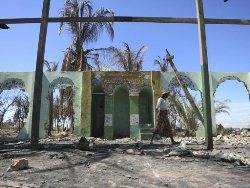Earlier this year a Buddhist woman was raped and murdered in western Myanmar. The authorities ‘charged’ three Muslim men.
A week later, 10 Muslims were murdered in a revenge attack. What happened next was hidden from the outside world.
Bloodshed pitted Buddhists against minority Rohingya Muslims. Many Rohingya fled their homes, which were burned down in what they said was a deliberate attempt by the predominantly Buddhist government to drive them out of the country.
"They were shooting and we were also fighting. The fields were filled with bodies and soaked with blood," says Mohammed Islam, who fled with his family to Bangladesh.
There are 400,000 Rohingya languishing in Bangladesh. For more than three decades, waves of refugees have fled Myanmar. But the government of Bangladesh considers the Rohingya to be illegal immigrants, as does the government of Myanmar. They have no legal rights and nowhere to go.
This is a story of a people fleeing the land where they were born, of a people deprived of citizenship in their homeland. It is the story of the Rohingya of western Myanmar, whose very existence as a people is denied.
Professor William Schabas, the former president of the International Association of Genocide Scholars, says: "When you see measures preventing births, trying to deny the identity of the people, hoping to see that they really are eventually, that they no longer exist; denying their history, denying the legitimacy of their right to live where they live, these are all warning signs that mean it's not frivolous to envisage the use of the term genocide."
Cruelty toward the Rohingyas is not new. They have faced torture, neglect and repression in the Buddhist-majority land since it achieved independence in 1948. Its constitution closes all options for Rohingyas to be citizens, on grounds that their ancestors didn’t live there when the land, once called Burma, came under British rule in the 19th century (a contention the Rohingyas dispute). Even now, as military rulers have begun to loosen their grip, there is no sign of change for the Rohingyas. Instead, the Burmese are trying to cast them out.
In mid-June, in the name of stopping such violence, the government declared a state of emergency. But it uses its border security force to burn houses, kill men and evict Rohingyas from their villages.
This is not sectarian violence; it is state-supported ethnic cleansing, and the nations of the world aren’t pressing Myanmar’s leaders to stop it.
In mid-June, after some Rohingyas fled by boat to villages in Bangladesh, they told horrifying stories to a team of journalists. They said they had come under fire from a helicopter and that three of six boats were lost. Some children drowned during the four-day trip; others died of hunger. Once in Bangladesh, they said, the families faced deportation back to Myanmar. But some children who had become separated from their parents made their way to the houses of villagers for shelter; other children may even now be starving in hide-outs or have become prey for criminal networks. Border guards found an abandoned newborn on a boat; after receiving medical treatment, the infant was left in the temporary care of a local fisherman.
The plight of the Rohingyas begins with their statelessness — the denial of citizenship itself, for which Myanmar is directly responsible. Ms. Aung San Suu Kyi, though not as powerful as the military officers who control Myanmar’s transition, should not duck questions about the Rohingyas, as she has done while being feted in the West. Instead, she should be using her voice and her reputation to point out that citizenship is a basic right of all humans. On July 5, the secretary general of the Organization of Islamic Cooperation, Ekmeleddin Ihsanoglu, appealed to her to speak up to help end the violence.
To be sure, Bangladesh can do more. Its river border with Myanmar is unprotected; thousands of Rohingyas have been rowing or swimming it at night. But even though Bangladesh has sheltered such refugees in the past — hundreds of thousands of Rohingyas live here now, legally or illegally — it has been reluctant so far this year to welcome them, out of fear of encouraging an overwhelming new influx. Already, such fears have aroused anti-Rohingya sentiment among some Bangladeshis, and initially Bangladesh’s government tried to force the refugees back without assisting them. After some villagers risked arrest by sheltering refugees in their homes, the government began to offer humanitarian aid, before sending them back on their boats. Bangladesh should shelter the refugees as it has in years past, as the international community is urging.
But the world should be putting its spotlight on Myanmar. It should not so eagerly welcome democracy in a country that leaves thousands of stateless men and women floating in a river, their corpses washing up on its shores, after they have been reviled in, and driven from, a land in which their families have lived for centuries.
PHOTO CAPTION
In this Nov. 7, 2012 photo, an ethnic Rakhine civilian wanders through a destroyed mosque in the Myanmar town of Pauktaw, two weeks after Rohingya Muslims were forced to flee the town.
Source: Agencies


 Home
Home Discover Islam
Discover Islam Quran Recitations
Quran Recitations Lectures
Lectures
 Fatwa
Fatwa Articles
Articles Fiqh
Fiqh E-Books
E-Books Boys & Girls
Boys & Girls  Ramadan
Ramadan Fatwa Audios
Fatwa Audios Month of Mercy
Month of Mercy Women
Women Eed Al- Fitr
Eed Al- Fitr Food Recipes
Food Recipes Videos
Videos

 Prayer Times
Prayer Times












